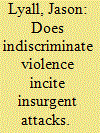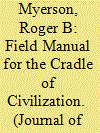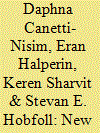| Srl | Item |
| 1 |
ID:
088414


|
|
|
|
|
| Publication |
2009.
|
| Summary/Abstract |
Does a state's use of indiscriminate violence incite insurgent attacks? To date, most existing theories and empirical studies have concluded that such violence is highly counterproductive because it creates new grievances while forcing victims to seek security, if not safety, in rebel arms. This proposition is tested using Russian artillery fire in Chechnya (2000 to 2005) to estimate indiscriminate violence's effect on subsequent patterns of insurgent attacks across matched pairs of similar shelled and nonshelled villages. The findings are counterintuitive. Shelled villages experience a 24 percent reduction in posttreatment mean insurgent attacks relative to control villages. In addition, commonly cited "triggers" for insurgent retaliation, including the lethality and destructiveness of indiscriminate violence, are either negatively correlated with insurgent attacks or statistically insignificant.
|
|
|
|
|
|
|
|
|
|
|
|
|
|
|
|
| 2 |
ID:
088419


|
|
|
|
|
| Publication |
2009.
|
| Summary/Abstract |
The U.S. Army's Counterinsurgency Field Manual, Bremer's My Year in Iraq, and Xenophon's Education of Cyrus all consider problems of establishing a state. Bremer sees constitutions as fundamental, and the Field Manual emphasizes local security operations and effective governance to establish legitimacy. But Xenophon shows how states are founded by leaders with reputations for reliably rewarding supporters. Agency incentive problems in government make patronage an essential aspect of state-building, and political leaders become fundamentally constrained by their reputations. Democratic competition requires many leaders to develop independent reputations for exercising power and patronage responsibly, which can be encouraged by political decentralization.
|
|
|
|
|
|
|
|
|
|
|
|
|
|
|
|
| 3 |
ID:
088415


|
|
|
|
|
| Publication |
2009.
|
| Summary/Abstract |
Does exposure to terrorism lead to hostility toward minorities? Drawing on theories from clinical and social psychology, we propose a stress-based model of political extremism in which psychological distress-which is largely overlooked in political scholarship-and threat perceptions mediate the relationship between exposure to terrorism and attitudes toward minorities. To test the model, a representative sample of 469 Israeli Jewish respondents was interviewed on three occasions at six-month intervals. Structural Equation Modeling indicated that exposure to terrorism predicted psychological distress (t1), which predicted perceived threat from Palestinian citizens of Israel (t2), which, in turn, predicted exclusionist attitudes toward Palestinian citizens of Israel (t3). These findings provide solid evidence and a mechanism for the hypothesis that terrorism introduces nondemocratic attitudes threatening minority rights. It suggests that psychological distress plays an important role in political decision making and should be incorporated in models drawing upon political psychology.
|
|
|
|
|
|
|
|
|
|
|
|
|
|
|
|
| 4 |
ID:
088417


|
|
|
|
|
| Publication |
2009.
|
| Summary/Abstract |
This article analyzes the determinants of the variation in the levels of lethal violence against civilians during a civil war. It departs from the usual explanations of this variation, advancing two different logics to account for civilians' victimization: strategic violence directed to avoid rebellions by targeting would-be political entrepreneurs and violence as a consequence of the breakdown of the state's authority. It uses a new data set on violence against civilians during the Spanish Civil War of 1936 to 1939.
|
|
|
|
|
|
|
|
|
|
|
|
|
|
|
|
| 5 |
ID:
088416


|
|
|
|
|
| Publication |
2009.
|
| Summary/Abstract |
Why do states realign their foreign policies? I argue that democratic transitions are an important cause of foreign-policy realignment with the United States and, furthermore, that the nature of that realignment is conditioned by whether the United States supported the previous nondemocratic regime. American support, or lack thereof, for the ancien régime structures the domestic politics of democratic transitions. In the absence of previous U.S. support, democratization commonly leads to positive foreign-policy realignment toward the United States. Conversely, when the United States supports nondemocratic regimes, democratic transitions rarely produce positive realignment. I use an original data set of country- year dyads with the United States from 1950 to 2000. Using Markov Transition regression models, I find that the interaction of democratic transition and previous U.S. support is a powerful determinant of foreign-policy realignment. This research has important implications for international relations theory and American foreign policy.
|
|
|
|
|
|
|
|
|
|
|
|
|
|
|
|
| 6 |
ID:
088418


|
|
|
|
|
| Publication |
2009.
|
| Summary/Abstract |
This study examines the effect of biased versus neutral mediation on the content of peace agreements. The author argues that neutral mediators, who are engaged primarily because of their interest to end the war, will have incentives to hasten the reaching of an agreement to the expense of its quality. By contrast, biased mediators, seeking to protect their protégés, will take care to ensure that there are stipulations in an agreement guaranteeing the interest of "their" side or use their particular access and leverage to make their side agree to costly concessions. Biased mediation processes are therefore more likely than neutral mediation processes to lead to elaborated institutional arrangements that are generally considered conducive to democracy and durable peace, such as power sharing, third-party security guarantees, and justice provisions. Empirical analysis, covering the 1989-2004 period and building on data from 124 peace agreements, supports these claims
|
|
|
|
|
|
|
|
|
|
|
|
|
|
|
|